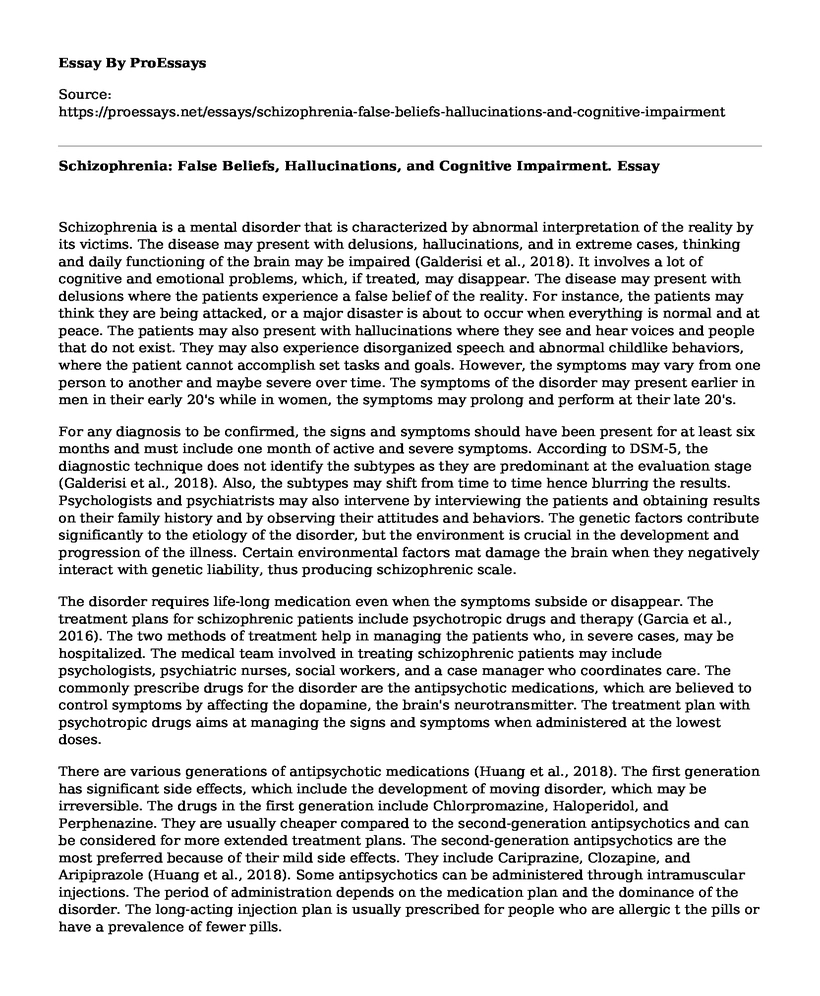Schizophrenia is a mental disorder that is characterized by abnormal interpretation of the reality by its victims. The disease may present with delusions, hallucinations, and in extreme cases, thinking and daily functioning of the brain may be impaired (Galderisi et al., 2018). It involves a lot of cognitive and emotional problems, which, if treated, may disappear. The disease may present with delusions where the patients experience a false belief of the reality. For instance, the patients may think they are being attacked, or a major disaster is about to occur when everything is normal and at peace. The patients may also present with hallucinations where they see and hear voices and people that do not exist. They may also experience disorganized speech and abnormal childlike behaviors, where the patient cannot accomplish set tasks and goals. However, the symptoms may vary from one person to another and maybe severe over time. The symptoms of the disorder may present earlier in men in their early 20's while in women, the symptoms may prolong and perform at their late 20's.
For any diagnosis to be confirmed, the signs and symptoms should have been present for at least six months and must include one month of active and severe symptoms. According to DSM-5, the diagnostic technique does not identify the subtypes as they are predominant at the evaluation stage (Galderisi et al., 2018). Also, the subtypes may shift from time to time hence blurring the results. Psychologists and psychiatrists may also intervene by interviewing the patients and obtaining results on their family history and by observing their attitudes and behaviors. The genetic factors contribute significantly to the etiology of the disorder, but the environment is crucial in the development and progression of the illness. Certain environmental factors mat damage the brain when they negatively interact with genetic liability, thus producing schizophrenic scale.
The disorder requires life-long medication even when the symptoms subside or disappear. The treatment plans for schizophrenic patients include psychotropic drugs and therapy (Garcia et al., 2016). The two methods of treatment help in managing the patients who, in severe cases, may be hospitalized. The medical team involved in treating schizophrenic patients may include psychologists, psychiatric nurses, social workers, and a case manager who coordinates care. The commonly prescribe drugs for the disorder are the antipsychotic medications, which are believed to control symptoms by affecting the dopamine, the brain's neurotransmitter. The treatment plan with psychotropic drugs aims at managing the signs and symptoms when administered at the lowest doses.
There are various generations of antipsychotic medications (Huang et al., 2018). The first generation has significant side effects, which include the development of moving disorder, which may be irreversible. The drugs in the first generation include Chlorpromazine, Haloperidol, and Perphenazine. They are usually cheaper compared to the second-generation antipsychotics and can be considered for more extended treatment plans. The second-generation antipsychotics are the most preferred because of their mild side effects. They include Cariprazine, Clozapine, and Aripiprazole (Huang et al., 2018). Some antipsychotics can be administered through intramuscular injections. The period of administration depends on the medication plan and the dominance of the disorder. The long-acting injection plan is usually prescribed for people who are allergic t the pills or have a prevalence of fewer pills.
References
Galderisi, S., Mucci, A., Buchanan, R. W., & Arango, C. (2018). Negative symptoms of schizophrenia: new developments and unanswered research questions. The Lancet Psychiatry, 5(8), 664-677.
Garcia, S., Martinez-Cengotitabengoa, M., Lopez-Zurbano, S., Zorrilla, I., Lopez, P., Vieta, E., & Gonzalez-Pinto, A. (2016). Adherence to antipsychotic medication in bipolar disorder and schizophrenic patients: a systematic review. Journal of clinical psychopharmacology, 36(4), 355.
Huang, M. W., Gibson, R. C., Moberg, P. J., & Caroff, S. N. (2018). Antipsychotics for schizophrenia spectrum disorders with catatonic symptoms. The Cochrane database of systematic reviews, 2018(10).
Cite this page
Schizophrenia: False Beliefs, Hallucinations, and Cognitive Impairment.. (2023, Jun 07). Retrieved from https://proessays.net/essays/schizophrenia-false-beliefs-hallucinations-and-cognitive-impairment
If you are the original author of this essay and no longer wish to have it published on the ProEssays website, please click below to request its removal:
- Essay Example: Timothy Treadwell, a Misguided Bear Enthusiast
- Case Study: WhatsApp Development
- Review of the Film Titled the Apology 2016 Paper Example
- Writing for Readers Paper Example
- Developing Effective Social Media Strategies - Essay Sample
- Forrest Gump - Movie Analysis Essay
- Essay Sample on Social Media: Connecting People and Building Relationships







